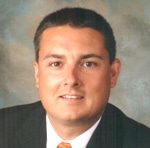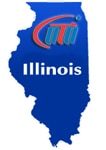
Mention in Illinois the names of the anti-union governors of Indiana and Wisconsin – Scott Walker and Mitch Daniels – and, well, just start watching, listening and counting.
When the Wisconsin and Indiana governors separately ventured into Illinois April 17 and 19 for pre-arranged speaking engagements in Springfield (Walker to business leaders) and Champaign (Daniels to Republican leaders) almost 10,000 union members and supporters in total at both locations showed up to demonstrate their displeasure.
They unfurled union banners, set up 20-foot inflatable rats and displayed signs proclaiming, “union buster.”
Both demonstrations were organized, in part, by the UTU’s Illinois State Legislative Office, Illinois State Legislative Director Bob Guy and the UTU Collective Bargaining Defense Fund.
In Wisconsin, Walker was an architect of legislation to curtail collective bargaining rights and weaken the organizing abilities of labor unions. He also rejected federal funds to build high-speed rail in Wisconsin, which cost Wisconsin hundreds of jobs. Because of grass roots efforts in Wisconsin by organized labor and its friends – funded in part by the UTU Collective Bargaining Defense Fund — Walker faces a recall election in June.
In Indiana, Daniels supported the recent passage by the state legislature of right-to-work (for less) legislation.
“Illinois UTU members were thrilled about the opportunity to gather with our brothers and sisters of labor to protest the appearance of governors who care more about business interests than the working families,” Guy said. “We sent strong messages to the two anti-union governors, as well as our Illinois lawmakers, that attacks on collective bargaining rights won’t work in Illinois.”
The Champaign rally included a workshop on the negative impact of right-to-work (for less) legislation on collective bargaining, and guidance on how union members should communicate the issue to their communities and fellow workers.

 Republican Gov. Scott Walker, the architect of anti-union legislation in his state, faces a recall election in June. He becomes the first governor in Wisconsin history to face recall.
Republican Gov. Scott Walker, the architect of anti-union legislation in his state, faces a recall election in June. He becomes the first governor in Wisconsin history to face recall. Voters in Ohio overwhelmingly restored to public employees Nov. 8 their collective bargaining rights that a conservative majority in the state legislature – with support from Gov. John Kasich — chose to revoke earlier this year.
Voters in Ohio overwhelmingly restored to public employees Nov. 8 their collective bargaining rights that a conservative majority in the state legislature – with support from Gov. John Kasich — chose to revoke earlier this year.